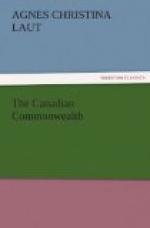In the West a something more entered into the national spirit. French fur-traders, wood-runners, voyageurs had drifted North and West, men of infinite resources, as much at home with a frying-pan over a camp-fire as over a domestic hearth, who could wrest a living from life anywhere. English adventurers of similar caliber had drifted in from Hudson Bay. These little lords in a wilderness of savages had scattered west as far as the Rockies, south to California. They knew no law but the law of a strong right arm and kept peace among the Indians only by a dauntless courage and rough and ready justice. They could succeed only by a good trade in furs, and they could obtain a good trade in furs only by treating the Indians with equity. Every man who plunged into the fur wilderness took courage in one hand and his life in the other. If he lost his courage, he lost his life. Indian fray, turbulent rapids, winter cold took toll of the weak and the feckless. Nature accepts no excuses. The man who defaulted in manhood was wiped out—sucked down by the rapids, buried in winter storms, absorbed into the camps of Indian degenerates. The men who stayed upon their feet had the stamina of a manhood in them that could not be extinguished. It was a wilderness edition of that dauntlessness which brought the Loyalists to Ontario and the French devotees to Quebec. This, too, made for a dogged, strong, obstinate race. At the time of the fall of French power at Quebec in 1759 there were about two thousand of these wilderness hunters in the West. Fifty years later by way of Hudson Bay came Lord Selkirk’s Settlers—Orkneymen and Highlanders, hardy, keen and dauntless as their native rock-bound isles.
These four classes were the primary first ingredients that went into the making of Canada’s national consciousness and each of the four classes was the very personification of strength, purpose, courage, freedom.
III
But Destiny plays us strange tricks. When Quebec fell in 1759, New France passed under the rule of that English and Protestant race which she had been fighting for two centuries; and when the American colonies won their independence twenty years later and the ultra-English Loyalists trekked in thousands across the boundary to what are now Montreal and Toronto and Cobourg, there came under one government two races that had fought each other in raid and counter-raid for two centuries—alien and antagonistic in religion and speech. It is only in recent years under the guiding hand of Sir Wilfred Laurier that the ancient antagonism has been pushed off the boards.




